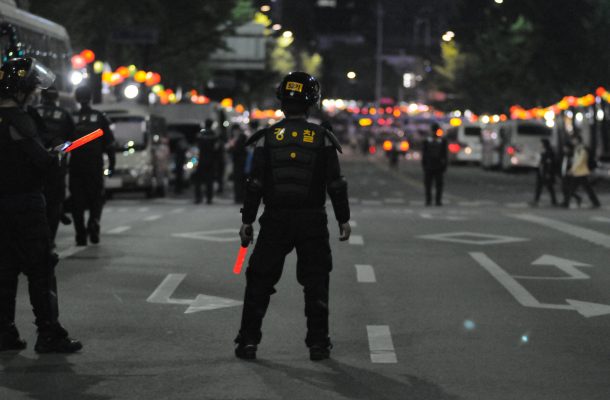Arvanitakis on American politics: Three key developments this week

One of the challenges in researching and writing about American politics is simply, ‘keeping up.’ While the Trump Administration has a unique way of capturing our attention, there are many other threads of political life that we should not ignore.
In regularly writing these columns, I have attempted to reflect on these: from the vulnerability of the middle and working classes, to the underlying reasons for rising populism in America (and around the world) as well and the hollowing out of many social democratic parties who have been captured by the promises of neo-liberal reform and in so doing, have lost a large part of their ‘supporter base.’
While there are many headlines this week that have captured our attention, looking beneath these highlights some important trends worth noting.
1. Joe Biden telling African Americans if you vote for Trump, ‘then you ain’t black’
Presumptive Democratic presidential candidate, Joe Biden, has attempted to portray himself as a statesmen, steadying hand and a unifying force during this pandemic as he contrasts himself with the President. While having limited airtime, Biden has been careful to be thoughtful, reflective and make statements that represents the most recent medical advice.
Drawing on his work with former president, Barack Obama, Mr. Biden has also been working to put forward his civil rights credentials to ensure the support of African American voters.
This all came crashing down when appearing on The Breakfast Club, a show popular with African American millennials. Biden made the following statement: ‘if you have a problem figuring out whether you’re for me or Trump, then you ain’t black.’
While the remark which prompted a storm of controversy and fierce attacks from both the left and right, it is a statement that confirms the concerns of many African Americans voters that they are being taken for granted by the Democratic Party. More so, Biden’s latest comments add to his “portfolio of blunders” that have many questioning his commitment to the black community.
For example, last year, Biden invoked tender memories of working with segregationist senators to make a point about civility – something that Sen. Cory Booker rightfully criticized Biden for.
What this shows is a clear misalignment between the Democratic Party and African Americans: a party that has promoted its multicultural credentials but ended up with two elderly white men as the two main presidential hopefuls.
All this should be seen through lens of developments in Minneapolis where thousands of protesters have poured into the streets to rage against race relations sparked by the murder of George Floyd, an African American man. Floyd was murdered by police officers and his death and captured on video and widely shared.
As Covid-19 disproportionately is impacting minority groups in America, Biden’s missteps matter as they highlight the size of the gap is between much of the political class and significant parts of US society.
2. Social media and fact checking
This week Twitter attached fact check warnings to President’s tweets. According to Twitter, it was the pandemic that forced it to place such warning because of Trump’s irresponsibility in claims around Covid-19 cures.
This is important for a number of reasons. The first is that it has brought Twitter into direct conflict with one of its most high-profile users. The response from the President was swift when he signed an executive order to make it easier for federal regulators to argue that companies like Facebook, Google and Twitter are suppressing free speech by suspending users or deleting posts.
According to the President, such tech companies have had, “unchecked power to censor, restrict, edit, shape, hide, alter any form of communication between private citizens or large public audiences”.
Unbeknown to many critics, Facebook removed a record number of hate speech posts over the last 12 months. In its biannual Community Standards Enforcement Report that highlights the number of controversial posts the company has removed from the platform, Facebook deleted 9.6 million pieces of content identified as ‘hate speech’ taken down between January and March 2020 compared to 5.7 million in the prior period.
This highlights the challenge of finding ways to manage the social media giants: how do we balance regulation with free speech and responding to hate speech?
While there is no doubt Trump’s move is politically motivated, this is a challenge that has been confounding policy makers from all political persuasions.
As such, the many people that have been demanding such media giants have greater accountability are now raising concerns of free speech. Accountability and free speech are a slippery concept that sees both the left and the right struggle to respond.
3. Hong Kong, China and the Trump Administration
The move my China to tighten its grips on Hong Kong has been driven by a Chinese central government who wants to show they are in control following the crisis of confidence brought on my Covid-19. As someone with dear friends in Hong Kong, I watch on in concern as the Territory’s democratic architecture is being dismantled.
The Trump Administration has a long record of responding to China’s actions. While some of it is driven by the need to reflect domestic attention from the Administration’s failings (such as calling Covid-19 the ‘China virus’), at other times it has rightfully responded to China’s adversarial conduct.
Trump’s critics have seen his Administration’s “America first” policy being ‘anti-globalisation’. But as Nadia Schadlow argues, Trump might be introducing needed correctives to policies of globalisation that have been pursued by earlier administrations that have allowed China to gain undue influence.
While we may not agree with the cutting of funding by the Trump Administration, demanding greater accountability by the World Health Organisation for example, is something that should be praised.
What all this shows is that we are now firmly in a new Cold War between the US and China.
For Australia, our Pacific ‘backyard’ is vulnerable. For decades we have seen Taiwanese embassies replaced by China missions throughout the Pacific with only 15 nations around the world now recognising Taiwan’s Republic of China name.
Australia has been slow to respond. Pacific Island nations have spent the last decade raising concerns about Australia’s lack of action on climate change and responding to entrenched poverty. Australia has not taken this seriously as highlighted by the Deputy Prime Minister who stated that, that the Pacific Islands will survive the climate crisis because they can always come to Australia to ‘pick fruit’.
This week, it was announced that some of Australia’s main television programming including Neighbours, Masterchef and 60 Minutes will air across the Pacific Islands to try and counter Chinese influence. While such cultural artefacts should never be discounted, it is probably not enough to win a new Cold War – and administrations in both the USA and Australia caught by an anti-climate change agenda are unlikely to move quickly to respond.
While these three events are notable on their own, they highlight deeper trends that we should all be concerned about. In the contemporary 24-hour non-stop news cycle, they are trends we rarely get to reflect on.
Professor James Arvanitakis is the Executive Director of the Australian American Fulbright Commission – one of the world’s most prestigious international education and cultural exchange programs.














